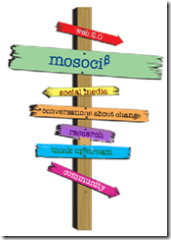 Some time back I became a Facebook “friend” with someone I had known professionally for several years. I did not work with the person all that much, but had great respect for the person based on the several dealings I had had with them. However, now that we were “friends” I was almost immediately exposed to two pieces of information that they had included in their Facebook profile: political affiliation and religion. As it happened, this particular person’s views were pretty much completely opposite to my own and before I could really think about it I experienced a deep knee-jerk reaction of “Oh, you’re kidding, he/she is not really one of them?” For a brief moment, until my brain could re-engage, my respect for that person plummeted through the floor. A moment or two later, the rational side of my brain kicked in and reminded me that I had had a great amount of professional respect for the person 10 seconds before and nothing had changed that should have altered that. Still, there was that deep emotional response.
Some time back I became a Facebook “friend” with someone I had known professionally for several years. I did not work with the person all that much, but had great respect for the person based on the several dealings I had had with them. However, now that we were “friends” I was almost immediately exposed to two pieces of information that they had included in their Facebook profile: political affiliation and religion. As it happened, this particular person’s views were pretty much completely opposite to my own and before I could really think about it I experienced a deep knee-jerk reaction of “Oh, you’re kidding, he/she is not really one of them?” For a brief moment, until my brain could re-engage, my respect for that person plummeted through the floor. A moment or two later, the rational side of my brain kicked in and reminded me that I had had a great amount of professional respect for the person 10 seconds before and nothing had changed that should have altered that. Still, there was that deep emotional response.
Politics? Religion? In the workplace? With professional colleagues? Huh?
At least here in North America, those are two topics that are generally taboo in the work environment. Verboten. In fact, in most areas you are not legally allowed to ask employees or potential employees about those topics. Within a work place there of course may be lunchroom discussions about recent politics and so you may learn of others viewpoints. Religion might come up, but again probably with people with whom you work closely.
But with customers? Or partners?
Never. At least in my experience.
And why should it come up, really? When you are buying a product/service from someone, or selling it to someone, what do politics or religion matter? (or gender or race?) If you are partnering with someone to deliver a service/product, again, why does it matter? What matters is whether both of you can work together and deliver the product/service – and presumably make some money through the deal.
Religion and politics should not matter in business dealings.
Now, of course, there are “business directories” that many churches offer trying to connect people within the church community, but that’s a different matter as it is within that community and trying to help each out. There are also websites out there that can help you steer your business toward companies with similar views as yours. But in general, the political leanings and religious preference of a supplier or customer do not factor into the normal course of business.
Yet here we are in Facebook choosing (or not) to provide all that information to (potential) customers.
I recognize that there are a good number of folks out there who are apathetic about all things related to politics and/or religion. They don’t care at all about what someone’s religion is or what their politics are. I’ve met many. Often they say they don’t care about religious/spiritual issues, haven’t attended a church (or spiritual service) in years (or ever) and haven’t voted in any elections. Religion and/or politics mean nothing to them and so they take no offense or don’t even notice when someone states their political or religious preference.
Leaving the completely apathetic aside, though, most people have some opinion about politics and some view about religion/spirituality. The stronger those views, of course, the more deep the emotional reactions. A hard-core liberal in the US may have (or at least appreciate) a bumper sticker “Friends don’t let friends vote Republican”. A hard-core conservative may view all liberals as traitors and the source of all the country’s problems. A strong “born again” Christian may see that the problems of the world are because people have not accepted Jesus Christ as their lord and savior and need to do so. A strong atheist may see that the problems of the world are because of the very existence of religion and that it is the root of all evil. These are deeply-ingrained views:
Politics and religion are part of our core identity that helps form who we define ourselves to be.
When that part of our identity is confronted by a polar opposite, we naturally react. Conservative Christians will have second thoughts about atheists, and atheists will have second thoughts about conservative Christians. Ultra-liberal Democrats will instinctively distrust ultra-conservative Republicans – and vice-versa. It’s just part and parcel of being human and building these beliefs into your identity.
Within the work environment, though, these twin areas of politics and religion have not been part of normal discourse… but yet, if you choose to fill out those fields in Facebook, they are suddenly exposed to all your “friends”.
It works the other way, of course. Some time back I added another “friend” whose politics and religion closely aligned with me. Again, without any rational thinking, the thought popped into my brain “Oh, he/she’s that. No wonder why we got along so well.” In the mass of people out there, we seek out those communities of like-minded people… those affinities that we can use to build stronger connections.
Which is why having fields for politics and religion make so much sense for Facebook’s original audience of college students. You are about to land in a campus of 10,000 people, of whom you know basically no one. How do you find new people? How do you find potential friends? Searching on “interests” is one way… but searching on political views or religion is another great way. Odds are that if they claim a similar religious view (or upbringing), they probably have a similar world view to yours. Likewise if they have similar political leanings, you probably have more in common upon which to potentially build a friendship. It makes total sense in that environment. Likewise, if Facebook is just used among your “friends”, odds are that they probably already know these views about you. But today we are overloading the term “friend” and so now it encompasses true “friends”, family… and business contacts.
So it’s one thing to share political/religious info with friends, family and classmates, but in business? I don’t know… on the one hand there is the greater “transparency” and the chance to make connections with other people. On the other hand, there is the strong chance of potentially alienating others.
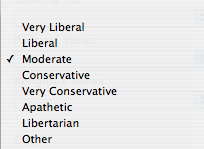 In any event, the fields are there in your Facebook profile if you choose to fill them out (and many people seem to during the process of signing up). Of course, you are limited to the choices that Facebook provides for politics. They don’t offer the “It’s Complicated” choice that they have for relationships, which would be quite useful. The “Religious Views” field is free text entry, so you can really write whatever you want there. It seems to me that you really have four choices:
In any event, the fields are there in your Facebook profile if you choose to fill them out (and many people seem to during the process of signing up). Of course, you are limited to the choices that Facebook provides for politics. They don’t offer the “It’s Complicated” choice that they have for relationships, which would be quite useful. The “Religious Views” field is free text entry, so you can really write whatever you want there. It seems to me that you really have four choices:
- Leave them blank – probably the safest choice, but potentially then losing out on some networking possibilities.
- Enter generic choices – you could be safe and choose “Moderate” and write in something vague for a religion.
- Fill out only one – you’ll see I have a political entry but not a religious entry.
- Fill them both out – embrace full transparency and let the world know (or at least your “friends”) your affiliations and beliefs.
To me this is just yet another one of those areas where we don’t fully understand the full impact of the profiles of Facebook and, in fairness, all the other social networking services. In the rush to join these services, we just fill out all sorts of information, not necessarily taking the time to think about the potential impact exposing that information may have.
What do you think? If you are a Facebook user, have you filled out those two fields? Do you think people should in an effort to be more transparent? Do you think we understand the full ramifications of exposing information like this? (Or do you think the issue I raise here is really not an issue?)
Technorati Tags: culture, facebook, politics, religion
 Almost to Ontario… California, that is. It’s been an absolutely exhausting three days here in Phoenix at AstriCon (coverage on my Disruptive Telephony blog), but now it’s time to get onboard yet another plane and head over to Ontario, California. As you can see in the picture, I’m now at the Phoenix airport at gate A10 waiting to get on a US Air flight out of here at 9:41pm. We have a plane and a crew, so that’s all good. We should start boarding in a few minutes. While it made sense to do these conferences back-to-back, it’s definitely a bit on the exhausting side. I am, though, very much looking forward to meeting many friends in the podcasting community. Just one more flight….
Almost to Ontario… California, that is. It’s been an absolutely exhausting three days here in Phoenix at AstriCon (coverage on my Disruptive Telephony blog), but now it’s time to get onboard yet another plane and head over to Ontario, California. As you can see in the picture, I’m now at the Phoenix airport at gate A10 waiting to get on a US Air flight out of here at 9:41pm. We have a plane and a crew, so that’s all good. We should start boarding in a few minutes. While it made sense to do these conferences back-to-back, it’s definitely a bit on the exhausting side. I am, though, very much looking forward to meeting many friends in the podcasting community. Just one more flight….
 In any event, the fields are there in your Facebook profile if you choose to fill them out (and many people seem to during the process of signing up). Of course, you are limited to the choices that Facebook provides for politics. They don’t offer the “It’s Complicated” choice that they have for relationships, which would be quite useful. The “Religious Views” field is free text entry, so you can really write whatever you want there. It seems to me that you really have four choices:
In any event, the fields are there in your Facebook profile if you choose to fill them out (and many people seem to during the process of signing up). Of course, you are limited to the choices that Facebook provides for politics. They don’t offer the “It’s Complicated” choice that they have for relationships, which would be quite useful. The “Religious Views” field is free text entry, so you can really write whatever you want there. It seems to me that you really have four choices:
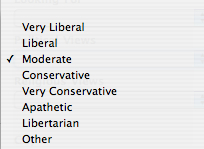 In any event, the fields are there in your Facebook profile if you choose to fill them out (and many people seem to during the process of signing up). Of course, you are limited to the choices that Facebook provides for politics. They don’t offer the “It’s Complicated” choice that they have for relationships, which would be quite useful. The “Religious Views” field is free text entry, so you can really write whatever you want there. It seems to me that you really have four choices:
In any event, the fields are there in your Facebook profile if you choose to fill them out (and many people seem to during the process of signing up). Of course, you are limited to the choices that Facebook provides for politics. They don’t offer the “It’s Complicated” choice that they have for relationships, which would be quite useful. The “Religious Views” field is free text entry, so you can really write whatever you want there. It seems to me that you really have four choices:
 Jeremiah Owyang continues to demonstrate today why Forrester hired him with a great (and lengthy) post called “
Jeremiah Owyang continues to demonstrate today why Forrester hired him with a great (and lengthy) post called “
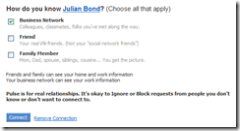
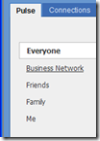
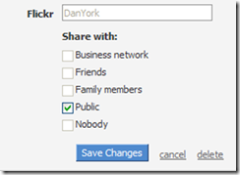 For instance, in the picture on the left, I am choosing to include my Flickr stream into my “Pulse Stream” and specifying that it is available to the public, but note the various choices that I have. (I am assuming that if I choose “Nobody” it will only be available to me when I view my Pulse Stream.)
For instance, in the picture on the left, I am choosing to include my Flickr stream into my “Pulse Stream” and specifying that it is available to the public, but note the various choices that I have. (I am assuming that if I choose “Nobody” it will only be available to me when I view my Pulse Stream.)